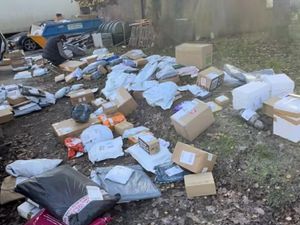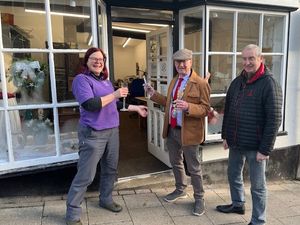Has Linda disproved a town's Dickens of a legend?
For Newport, it is a literary claim to fame - that the real-life model for Miss Havisham, the reclusive jilted bride in Charles' Dickens' classic Great Expectations, was a lady from the Shropshire town.
But, not to put too fine a point on it, is it all a load of bunkum?
Linda Fletcher, the archivist of Newport History Society, has been curious about the story and has been digging to find the truth about Newport's alleged Miss Havisham character, Elizabeth Sarah Parker.
And her conclusions are bad news for this bit of Newport folklore.
"My conviction is that there is no evidence either for Dickens staying in Newport or for Miss Parker being the model for Miss Havisham," says Linda.
"I should be grateful to hear from anyone who can come up with any evidence to refute this."
The story goes that Miss Parker of Chetwynd House lived the life of a recluse after being jilted by Sir Baldwyn Leighton on her wedding day, and that Dickens heard about it while staying in Newport, and used her as his inspiration for Miss Havisham.
After her heartbreak, it is said, Miss Parker spent almost the entire rest of her life in the upper rooms of Chetwynd House, and the ground floor was not furnished except for one room which never saw the light of day, where she kept her wedding cake, on top of which were candles which burned continuously.
She only attended one public function, a ball in Newport, to which she went in her wedding gown because it was rumoured, wrongly, as it turned out, that Sir Baldwyn would be there.
Today there is even a Havisham Court in Newport, a name which takes a nod to the Dickens link.
Miss Parker died on June 13, 1884, and was buried at Chetwynd church.
The history society's archives include private research and letters from T W Picken, a Newport researcher who lived from 1834 to 1919 who was not averse to gathering gossip, but nevertheless mentions nothing about Miss Parker, nor of any visit by Dickens to Newport - even though this would have happened in Picken's time.
"Dr Tony Williams, the president of The Dickens Fellowship, has helped with the research, and has searched all the surviving Dickens letters, diary entries and ‘The Dickensian’ journals. He reports that there is no mention of Dickens visiting Newport, or even Whitchurch or Oswestry where Miss Parker lived before.
"You may ask; surely Dickens visited Tong when he was writing The Old Curiosity Shop (1840-41) and travelled up the main road to Newport at that time? The fact is that he seems only to have known the name ‘Tong’ because his paternal grandmother worked at Tong Castle at one time."
As for Newport's Miss Parker, she was born in 1802 at Hatton Grange, Shifnal, and before long her family moved to Sweeney Hall, near Oswestry where she was still living at the time of the 1841 census. At the time of the 1851 census she was at Chester, in 1861 at Whitchurch, but by 1863, and now in her sixties, was at Chetwynd House, Newport, where she lived until her death.
"She was, therefore, not a Novaportan, and was definitely not living in Newport when Great Expectations was written (1859-60).
"So, we have no evidence of Dickens visiting Newport, and we know that Miss Parker did not live in Newport until after Great Expectations was published."
The central thread of a newspaper account published in 1949 telling of Miss Parker's role in forging the Miss Havisham character was that she had been due to marry Sir Baldwyn Leighton, the marriage day was fixed, the guests invited and the reception at Chetwynd House prepared, but alas Sir Baldwyn, at the last minute, changed his mind and married somebody else.
Linda says that it could not have happened at Chetwynd House as she was not living there then. The person Sir Baldwyn married instead was Elizabeth's elder sister, Mary.
Also, contrary to the story, she did not call a halt to any public life.
Meanwhile Sir Michael Leighton, of Loton Park, Alberbury, was unable to shed any light on the tale of the jilted bride which if true would impinge on his own family history.
"My father never spoke a word and it's not written in any of the family history, although I had heard the rumour," he said.





